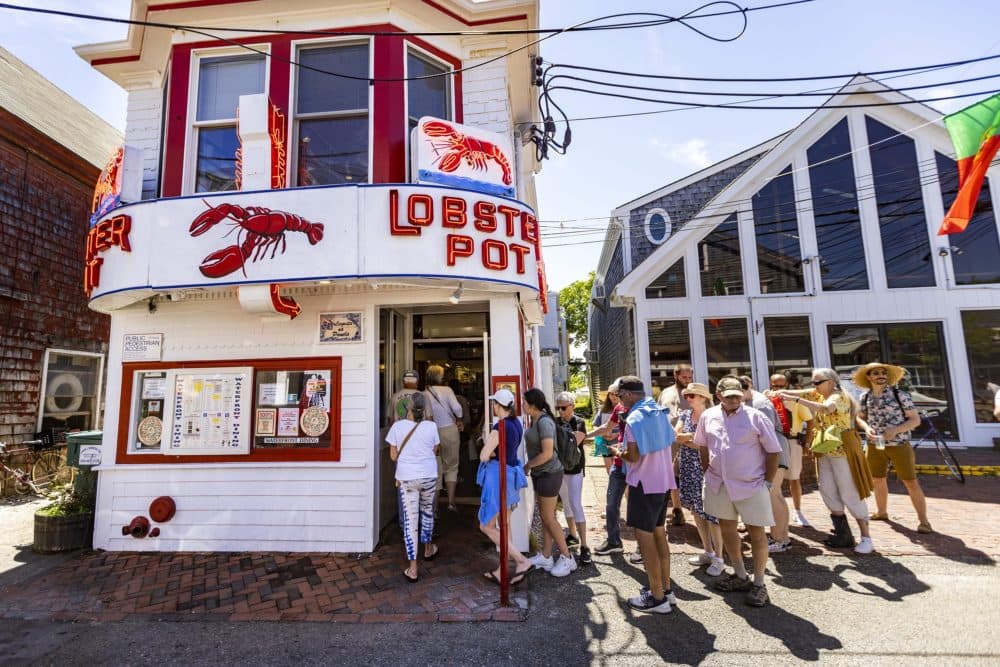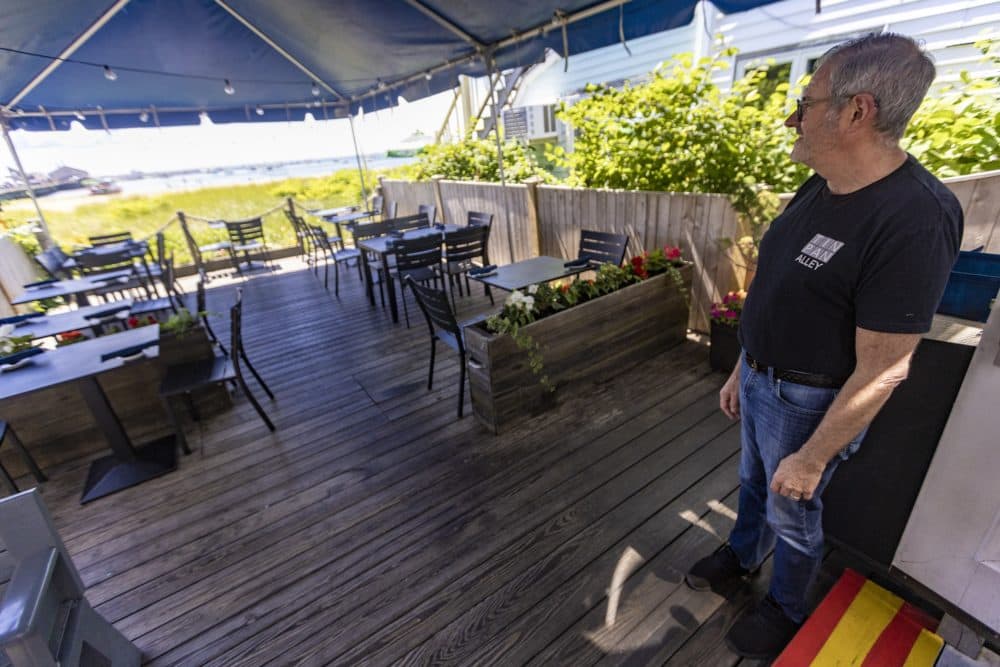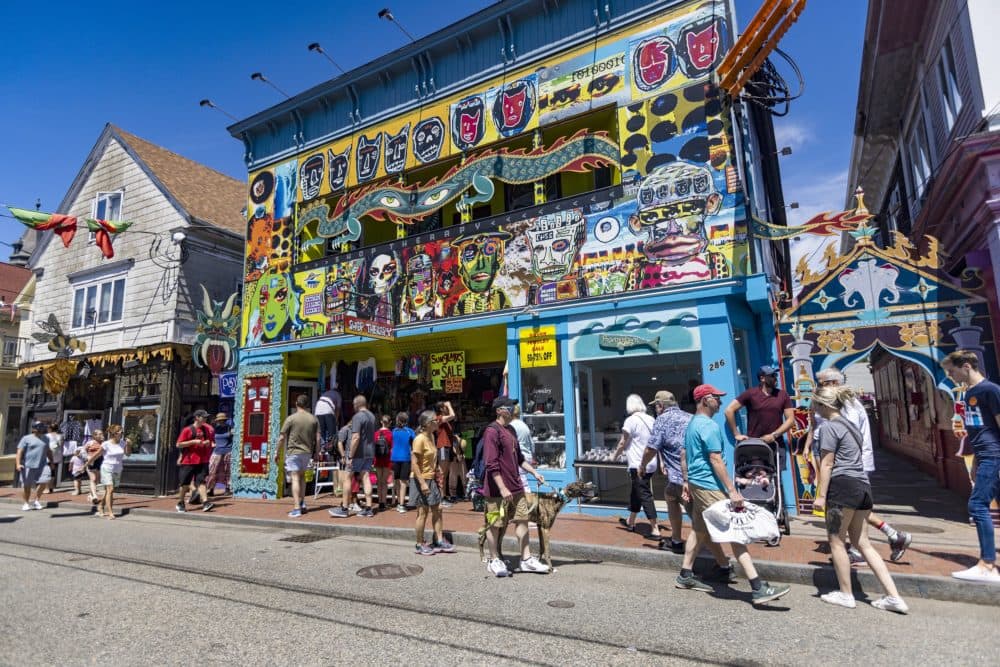Advertisement
Coronavirus Coverage
A Provincetown outbreak upended the 'hot vax summer,' but showed how to contain COVID
Resume
This time last year, many people felt ready to party. COVID rates were low, more people were getting vaccinated, and public health officials were announcing it was okay to shed masks and gather with friends. That excitement came to a screeching halt after July 4th festivities in Provincetown left more than 1,000 people with COVID.
The Provincetown outbreak is now seen as a critical moment in the pandemic. It showed the world that vaccines would not bring about the end of COVID, but it also provided important lessons on how to contain its spread.
Public health experts and Provincetown residents say they are keeping those lessons in mind as they prepare for another Independence Day weekend.
Why The Provincetown Outbreak Was So Significant
Provincetown is a hub for the LGBTQ community, and the July 4th holiday often draws big crowds — sometimes as many as 100,000 people — to a relatively small seaside town. Last year it was rainy, so people gathered indoors, filling up the area's clubs and restaurants.
“It was unbelievably busy. There was a real pent up demand," said Paul Melanson, who co-owns The Post Office Cafe and Tin Pan Alley restaurant. "People hadn't done anything in two years. They finally had the vaccine, and it was all over.”
Except it wasn't.

Heading into the weekend, there were no cases in the area. A week later, the positive cases started rolling in. For a highly vaccinated population, this came as a big surprise.
“This was absolutely a key moment and a bit of a turning point, certainly in our thinking,” said Bronwyn MacInnis, the director of genomic surveillance at the Broad Institute of MIT and Harvard. “It just showed us that there was more to come, and the virus had more tricks up its sleeve.”
MacInnis and her team used clues from the virus's genetic code to trace how the outbreak spread through Provincetown. They discovered that fully vaccinated people could still get infected and, perhaps even more concerning, they could still spread COVID.
“The takeaway was essentially just that vaccinated individuals were almost as capable as unvaccinated individuals in spreading the virus,” she said, adding that other factors, such as viral load and length of exposure time appeared to have a bigger effect on transmission than vaccination.
This realization prompted the Centers for Disease Control and Prevention to reverse earlier guidance and recommend masking for vaccinated people indoors in certain settings.
How Provincetown Crushed The Outbreak
The delta variant did sweep through Provincetown and later, the country, but not because of this outbreak.
Although about half of the people infected in Provincetown were from outside of Massachusetts, MacInnis and her team found no evidence that this particular strain continued to spread after visitors returned home from the festivities.
“It was a big outbreak, and it had a lot of impact on the community, but it didn't spread further,” MacInnis said. “It is pretty incredible.”

Experts explain this by pointing to two things. First, there was a quick response from government that included setting up testing sites, contact tracing, and running vaccination campaigns in the area. Second, many public health experts credit the LGBTQ community for being proactive and transparent.
People got tested. They isolated or quarantined. And they alerted friends and contacts who might have been exposed.
“This is not my community's first pandemic," explained state Senator Julian Cyr, a Cape Cod Democrat who was in Provincetown that weekend and helped coordinate the outbreak response. "This is the second pandemic of our era. The first, of course, being the HIV/AIDS pandemic.”
Cyr believes that earlier experience made people more likely to take action when they began hearing about positive test results.
“That kind of lived history really prompts us to be a community that seeks health care, and that health seeking behavior actually allows us to get ahead of infectious diseases that maybe you wouldn't be able to pick up in the general population as quickly,” he said.
For example, Cyr points out that even though some people felt blamed and shamed for the outbreak, they still shared their status. Now, experts look at this as a case study for how to contain COVID when there are signs of an outbreak.
One Year Later, Provincetown Readies For Another Fourth of July Celebration
Provincetown is gearing up for big crowds this year. Many hotels are booked up, and restaurant reservations are filling quickly.
Walking through the town's central artery, some folks are wearing masks but not many.
For people who work there — everyone from fishermen to café owners — last year’s outbreak remains a stark memory. It ruined what they thought would be a record-breaking season.
Frank Christopher, co-owner of The Club restaurant and nightclub, said even if his customers are no longer thinking about COVID, he is. The pandemic is still scrambling the supply chain for him and many other small business owners, and he worries the customer base in Provincetown has yet to fully recover.
“I don’t feel like the pandemic is anywhere in the rearview mirror,” he said. “I feel that for every one customer that is wearing a mask, there are 20 customers that aren’t coming out.”
But others aren’t as focused on COVID. Some local officials and business owners said people now know how to calibrate their risk, and many have already had the virus and are vaccinated to prevent severe illness.
“The focus and the angst going into the summer season, I think, is less on COVID and more so on trying to figure out monkeypox,” said Cyr, the state senator.
While monkeypox is not common, a widening international outbreak is disproportionately affecting men who have sex with men. In May, the first U.S. case this year was detected in Massachusetts, and other cases have followed.
Provincetown business owners worry about how the lengthy quarantine period could pose a problem for staffing, and Cape Cod officials are trying to get out in front of the virus with education sessions and informational postcards.
The federal government recently announced an expanded effort to test and vaccinate those who may have been exposed to the virus.
The hope is that lessons learned from last year’s COVID outbreak will be useful in confronting yet another infectious disease.
This segment aired on June 30, 2022.
